Voice Search SEO: How to Optimize in 2024
Today I shall teach you how to optimize your website for voice search in 2024.
All of these strategies and tips are based on the real data.
In fact, I have analyzed 10,000 Google home search results to get better understanding how voice search works.
I studied the role of 11 potential voice search SEO ranking factors such as schema, HTTPS, pagespeed on rankings
In this post, I shall share my discovery. I shall also show you how can you use our findings to optimize your site for voice search.
A Summary of Our Most Interesting Findings Are As Follows:
1: PageSpeed plays an important role in voice search SEO. The average voice search result page loads in 4.6 seconds (52% faster than the average page).
- HTTPS sites dominate Google’s voice search results. In fact, 70.4% of Google Home result pages are secured with HTTPS.
- Google gives preference to short and comprehensive answers to voice search queries. The typical voice search result is only 29 words in length.
- Schema may not play a key role in voice search rankings.36.4% of voice search results come from pages that use Schema (which is only slightly higher than the worldwide average of 31.3%).
- Domains that have authority tend to produce voice search results significantly more as compared to non-authoritative domains.In fact, the mean Ahrefs Domain Rating of a Google Home result is 76.8.
- Content with high levels of social engagement tends to perform well in voice search. In fact, the average voice search result has 1,199 Facebook shares and 44 Tweets.
- Simple, easy-to-read content, it includes readability level, may help with voice search SEO. The average Google voice search result is composed at a 9th grade level.
- I found that very few voice search results had the exact query in their title tag. That is why creating individual pages for each voice search query does not appear to be an effective voice search SEO strategy.
- The average word count of a voice search result page is 2,312 words. That is why Google tends to source voice search answers from long form content.
- Content that ranks highly like in top 3 in desktop search is also very likely to appear as a voice search answer. In fact, approximately 75% of voice search results rank in the top 3 for that query.
- Appearing in a Featured Snippet may help you rank in voice search. 40.7% of all voice search answers came from a Featured Snippet.
I have detailed data and insights from my findings below.
Fast-Loading Websites Appear To Have an Edge in Google Voice Search Results
To know the relationship between voice search and site loading speed, I have analyzed the pagespeed of the results in our data set.
And I have found that loading speed of a voice search result was much faster as compared to most of webpages.
Specifically, I have found that the average time to first byte (TTFB) of a voice search result was 0.54 seconds vs the average of 2.1 seconds worldwide.
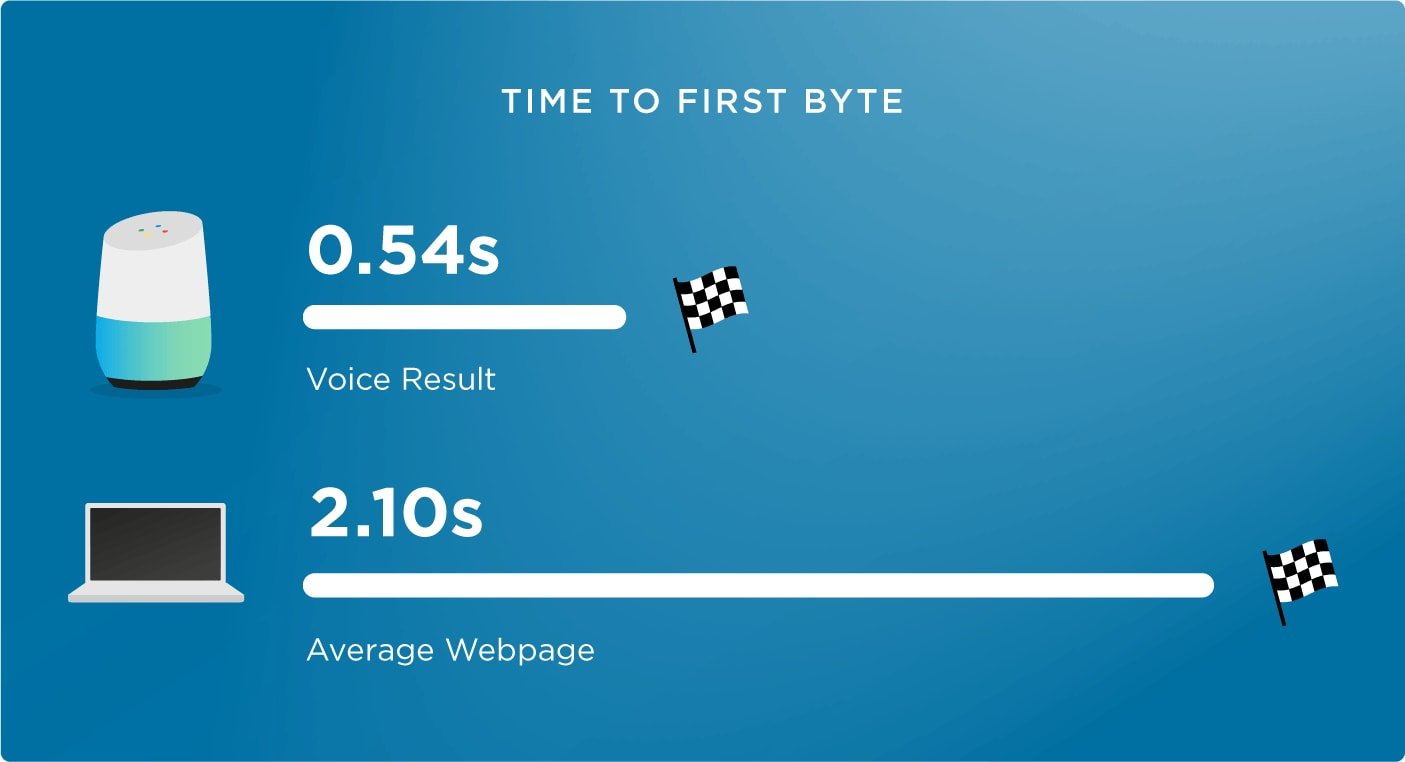
I also found that the time it took for a search result page to load entirely in 4.6 seconds was faster than most pages of 8.8 seconds.
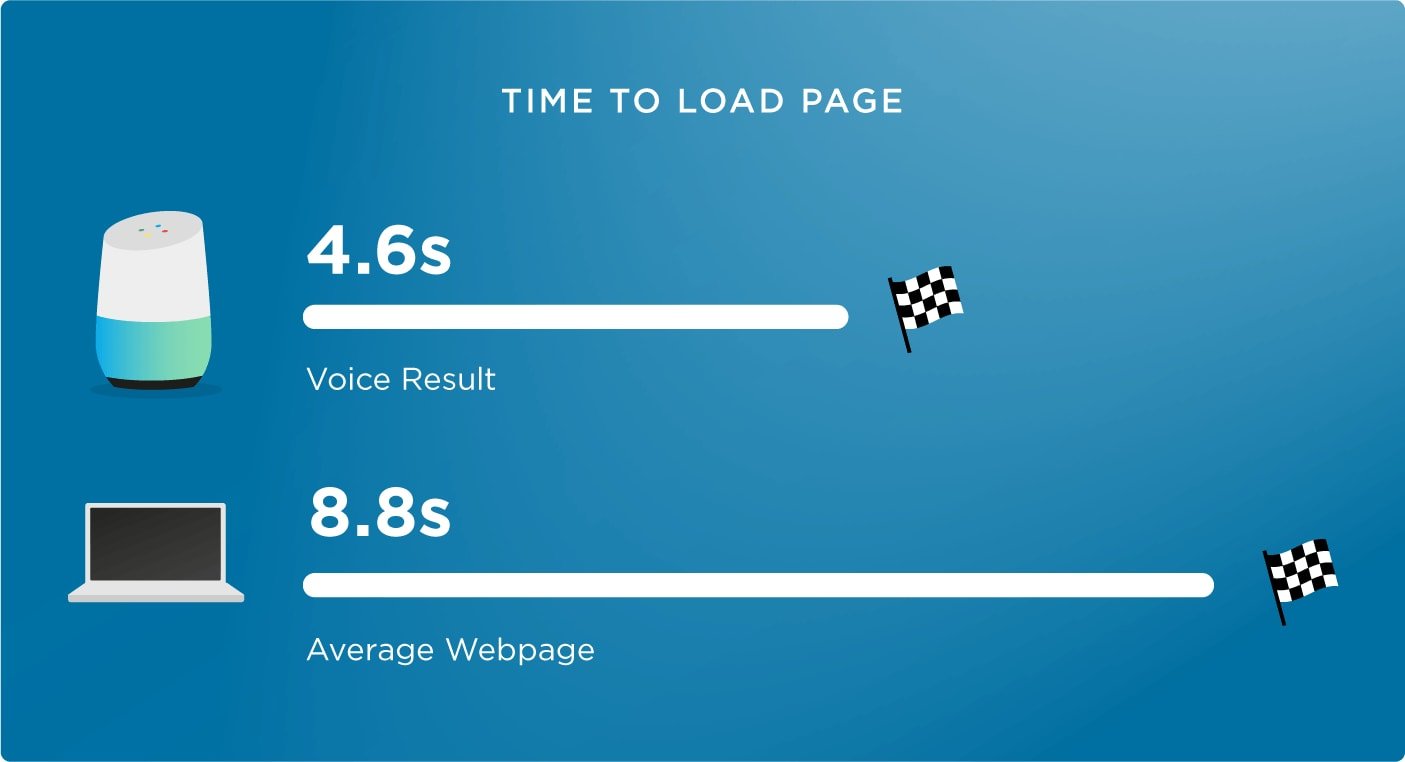
As you may have learned, Google recently announced their “Speed Update“.
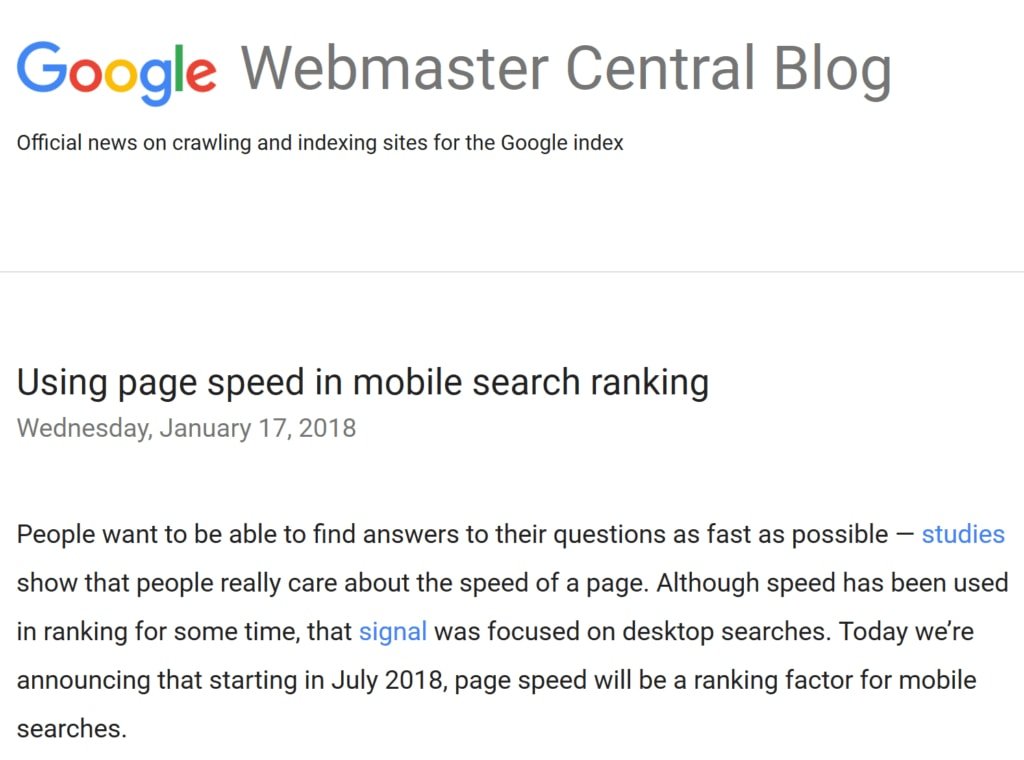
This update has made the loading speed of a website an important ranking factor or signal. In fact, in the announcement of this update, Google states:

This philosophy is also applicable to voice search results.
When you ask Google Assistant or Google home a question, you will not wait for device to give you an answer. You want your answer asap.
That is why it is reasonable that Google’s voice search algorithm will use page loading speed as an important ranking signal.
Google voice search algorithm may use Pagespeed as a ranking signal. The average voice search result loads in 4.6 seconds which is 52% faster than the worldwide average. So if you want to get ranking in voice search, you need to make sure that your site loads as early as possible.
HTTPS-Secured Websites Dominate Google Voice Search Results
Google also notified that HTTPS or SSL can give your site a “minimal boost” in the search results.
But does this also apply to voice search?
Our data also recommend that HTTPS may play an even more significant role in voice search than searches done on a mobile or desktop devices.
In fact, I discovered that 70.4% of the voice search result URLs have HTTPS.
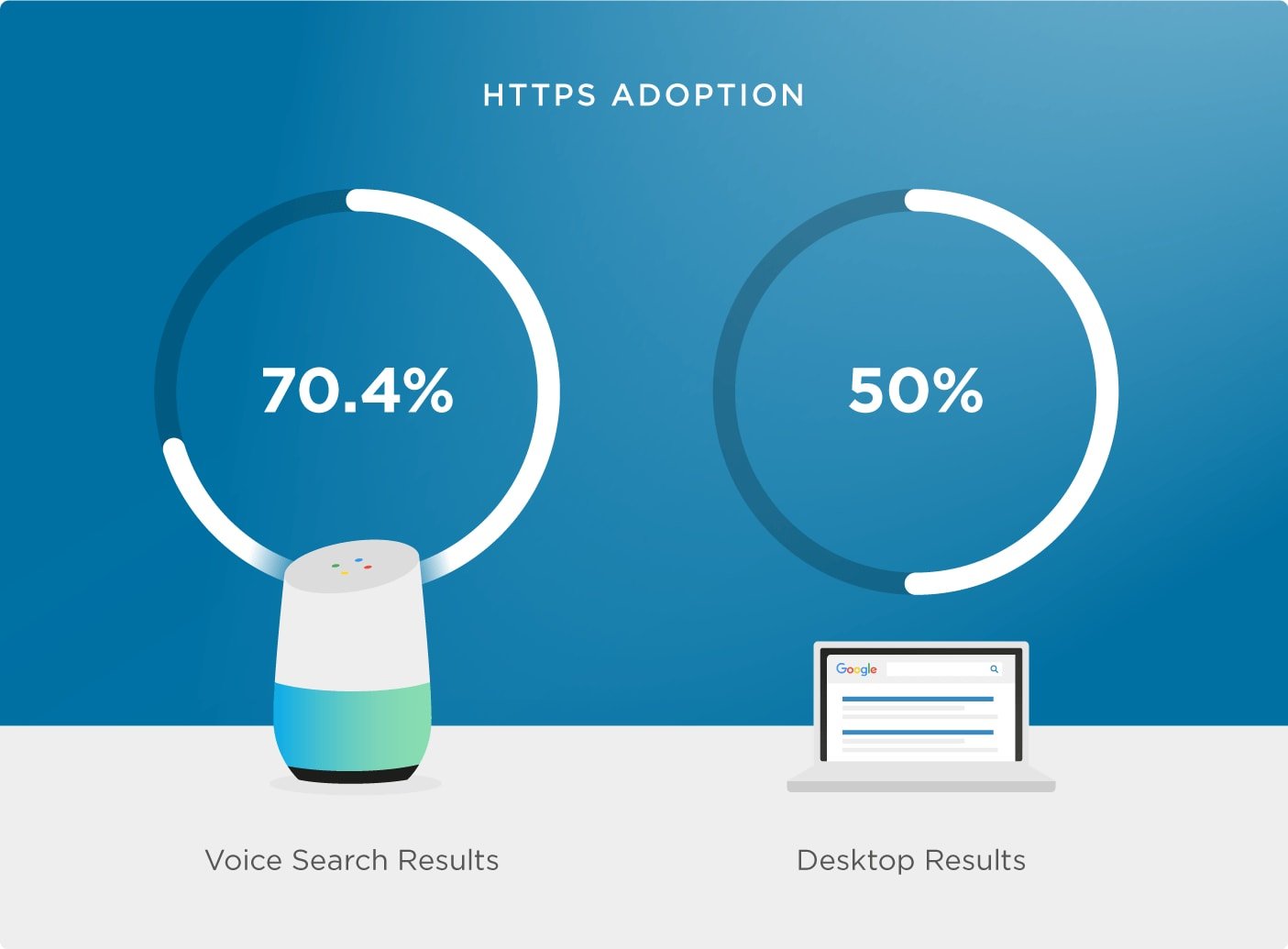
After the investigation of several other factors, this relationship can be chance correlation. After all, if you want to take the time to compose search engine optimized content, you will also want to spend the money as well as time to set up HTTPS.
The main point is, voice search results tend to use HTTPS significant results 70.4% as compared to other results on the first page of Google. Those pages are also optimized for SEO.
Does Google consider HTTPS more important for voice search results?
It is not possible to tell using our data alone. If you want to rank in voice search, HTTPS may help you.
Key Takeaway: Voice search results give preference to use HTTPS sites than other ranking websites on the first page of Google. Therefore, using HTTPS may give rise to your chance of appearing as a voice search results.
Voice Search Results Tend to Be Short and Concise
It is clear from going through Google’s Voice Search rater guidelines that they want voice search results which are very brief and to-the-point.
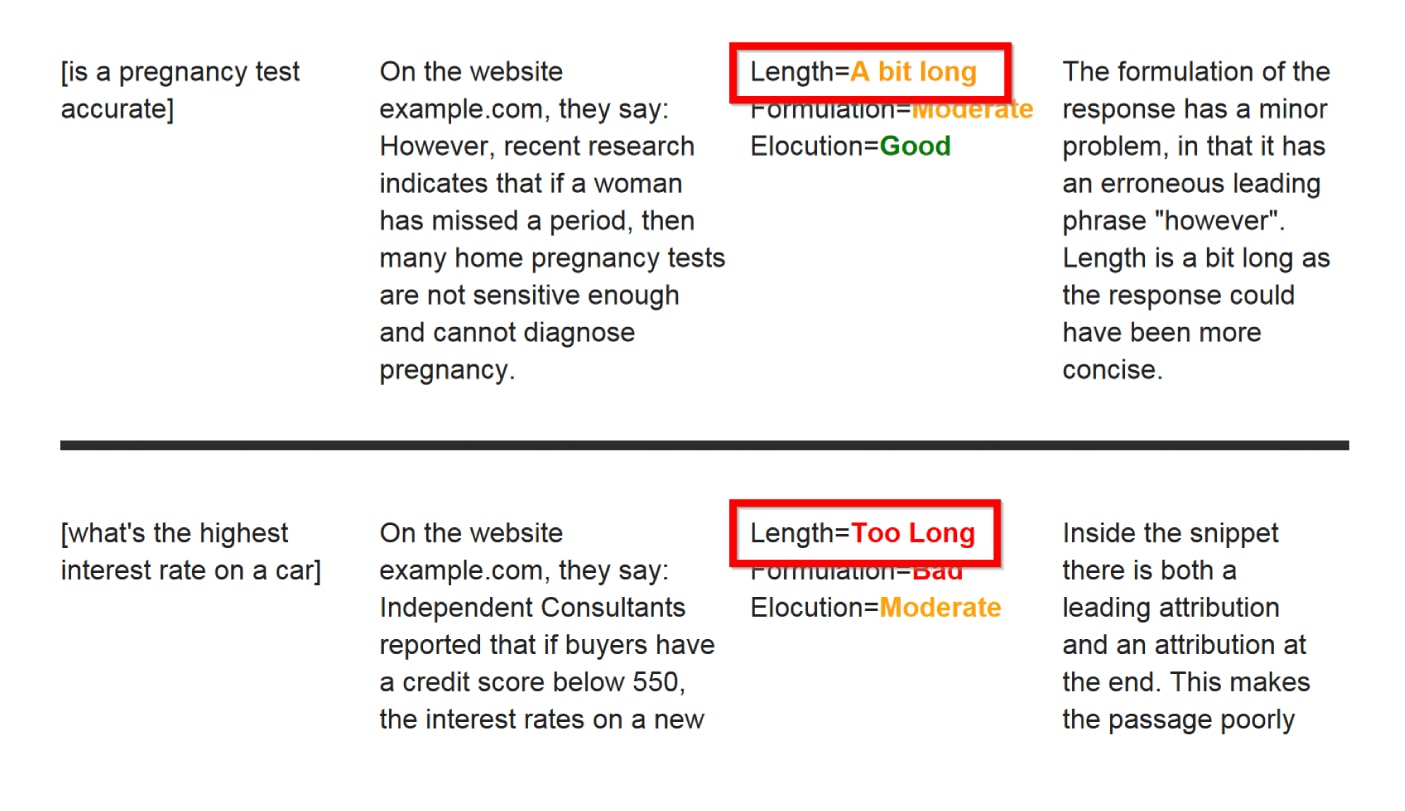
In my opinion, the examples present in rater guidelines consist of appropriate length. However, Google disagrees. They want voice search results or answers to be as comprehensive as possible.
And our data supports this. In fact, I discovered that the average voice search answer consists of 29 words.
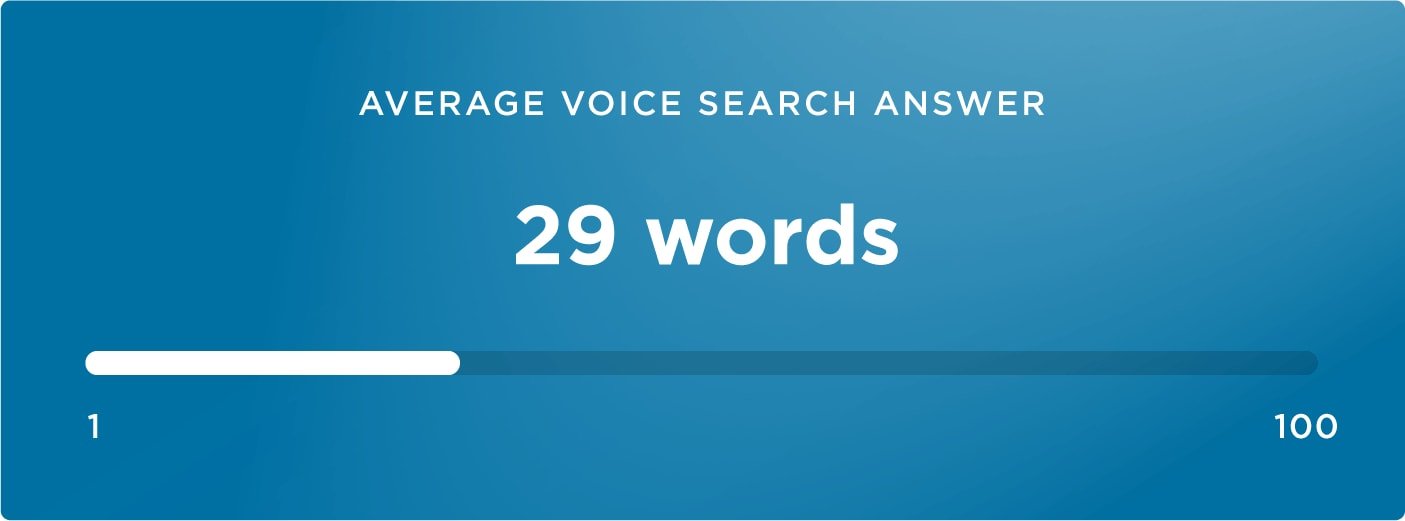
For example, here is a question and answer from one of the 10,000 searches I performed for this study:
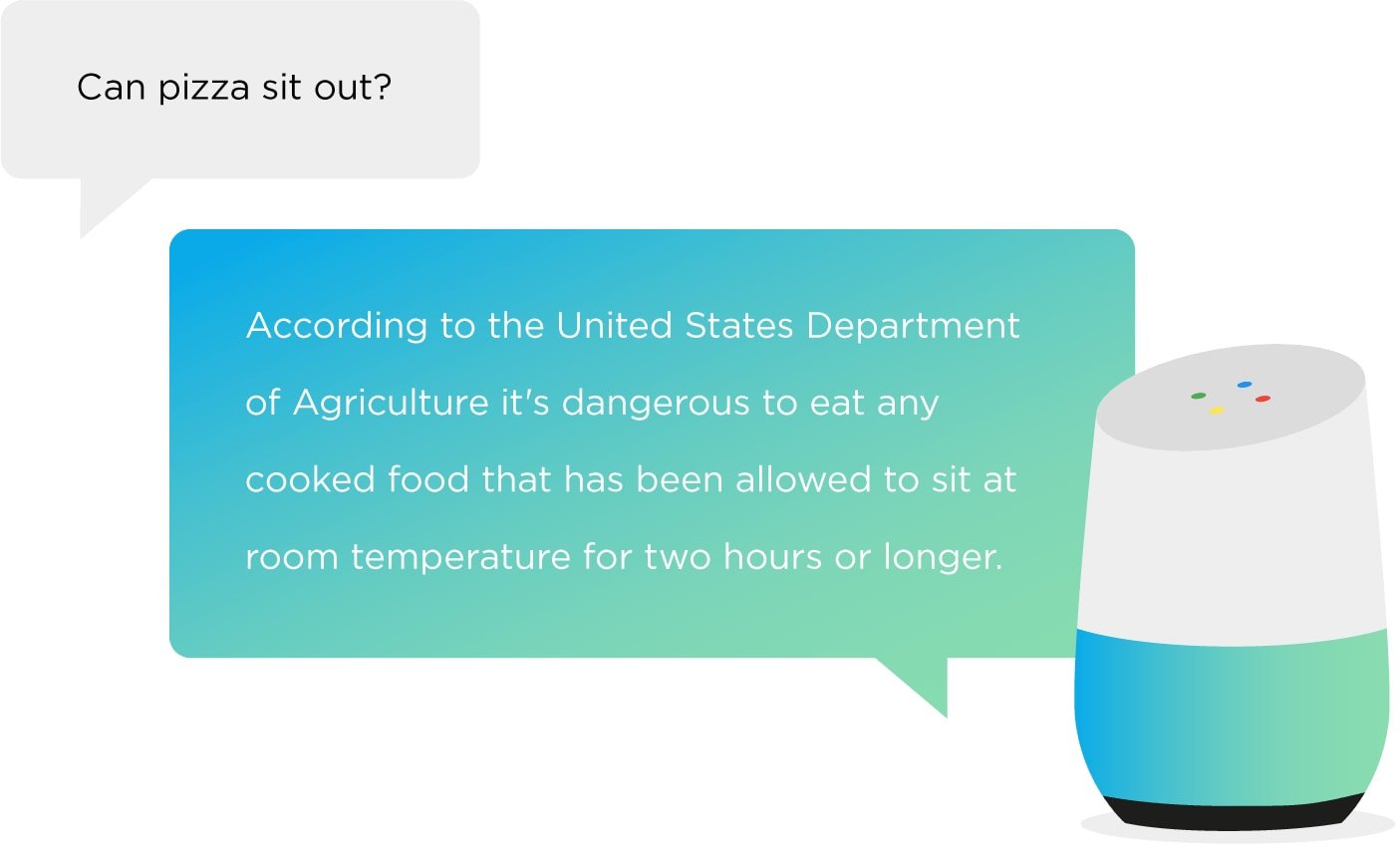
That answer is a true representative of a typical Google home answer because it consists of 29 words.
So if you want to optimize your content to rank in Google home or Google assistant, make your answer snippet more than 45 words but provide a thorough answer to your query. It is not clear how this applies to Alexa, Amazon, Siri and other voice search platforms.
Key Takeaway: Google voice search results are very concise in nature. In fact, the average search result is 29 words long. In order to optimize for voice search, you need to make your answer snippets approximately 29 words long.
Using Schema.org Markup May Not Help Your Voice Search Rankings
You may already aware of that Schema.org markup can help search engines better understand your content.
But does using Schema have an impact on voice search results?
Probably not.
My data discovered that 36.4% of voice search results pages used Schema markup vs 31.3% for the average page on the internet).
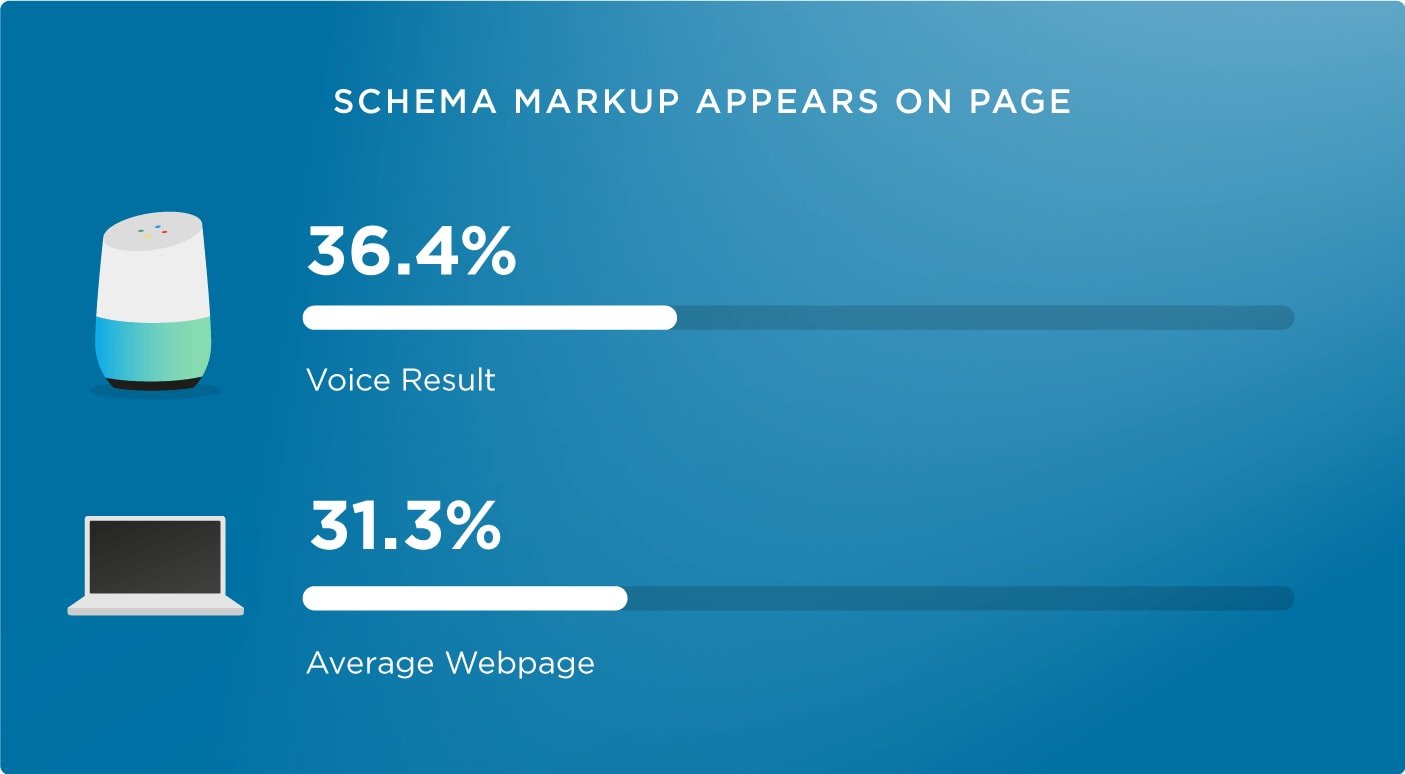
Although voice search result pages use Schema on regular basis than your average web page, the different is not significant. 63.6% of voice search results do not use Schema as well. That is why it is not true that Schema has a direct impact on voice search rankings.
I also analyzed the type of Schema used most often on voice search result pages. Here is what I found:
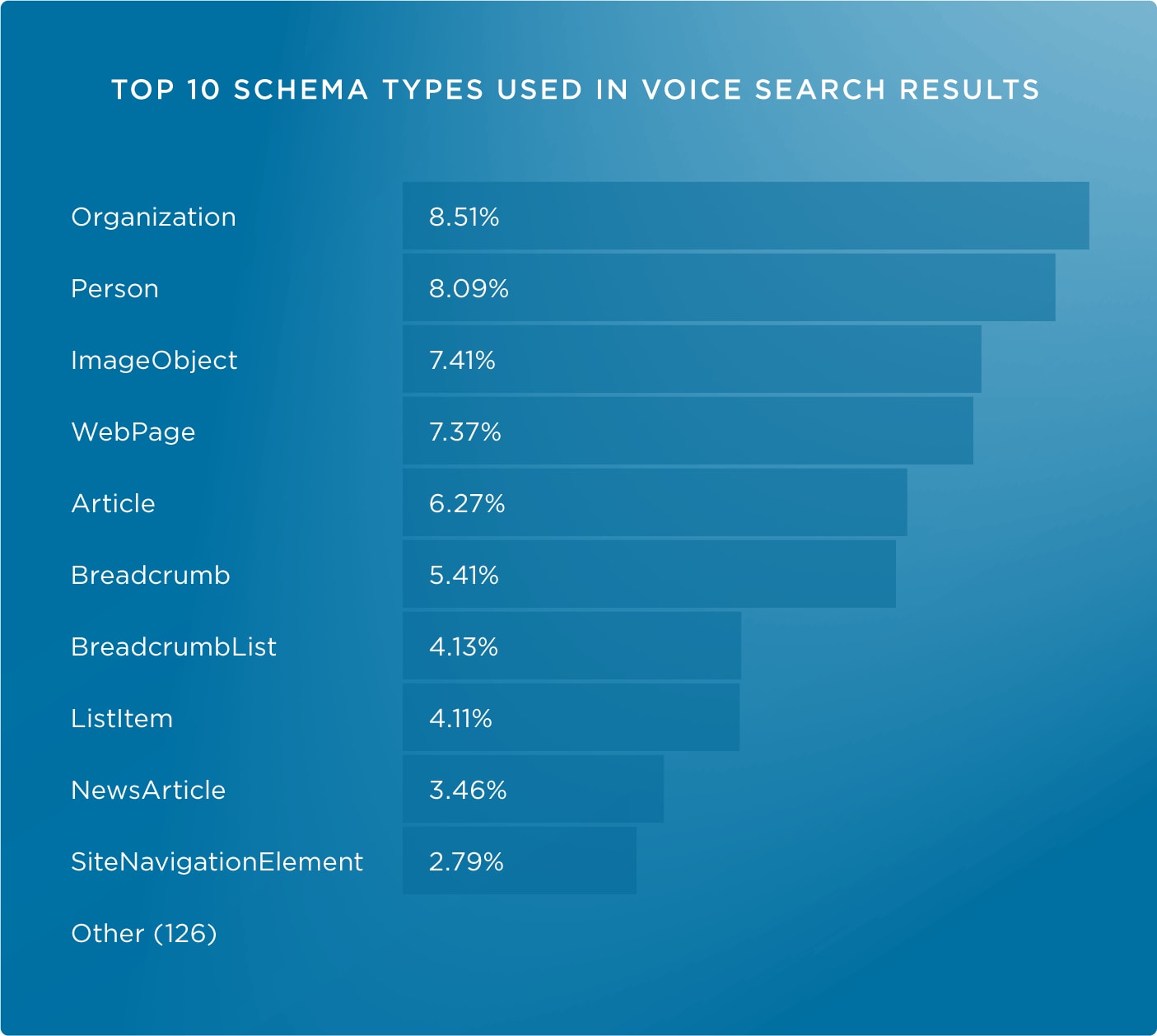
But it is not possible to say from our data alone whether Schema can help you to rank better for voice search results.
When you use Schema properly, it can improve your search visibility on any platform. So it is sensible to use it even if does not help with voice search SEO.
Key Takeaway: Schema can help your SEO efforts in general. However, our data do not suggest that it has an impact on voice search rankings.
Websites With Strong Link Authority Tend to Rank Best In Voice Search
We all know that backlinks are a part and parcel of Google’s mobile and desktop algorithm.
We analyzed every result for its domain rating and page rating, these are two metrics by Ahrefs to know page-level link authority to see if backlinks play an important role in voice search.
And we came to know that the average domain rating of a voice search result was 76 plus.

There is no doubt in saying that it is a considerably high DR.
I found that the link authority of voice search result pages was significantly lower. In fact, the mean page rating of a voice search result was only 21.1.

What might explain this?
Google home gives you a single answer to your question instead of a list of 10 blue links in a traditional way. It means that Google has to be confident that it is providing the accurate information or content.
To make sure the accuracy, the voice search algorithm may depend on domain authority over page authority.
In short words, once Google finds a reasonable voice search answer on a trusted site, it will not care how many links are pointing to your page.
For example, here is one of the voice search results from our study:
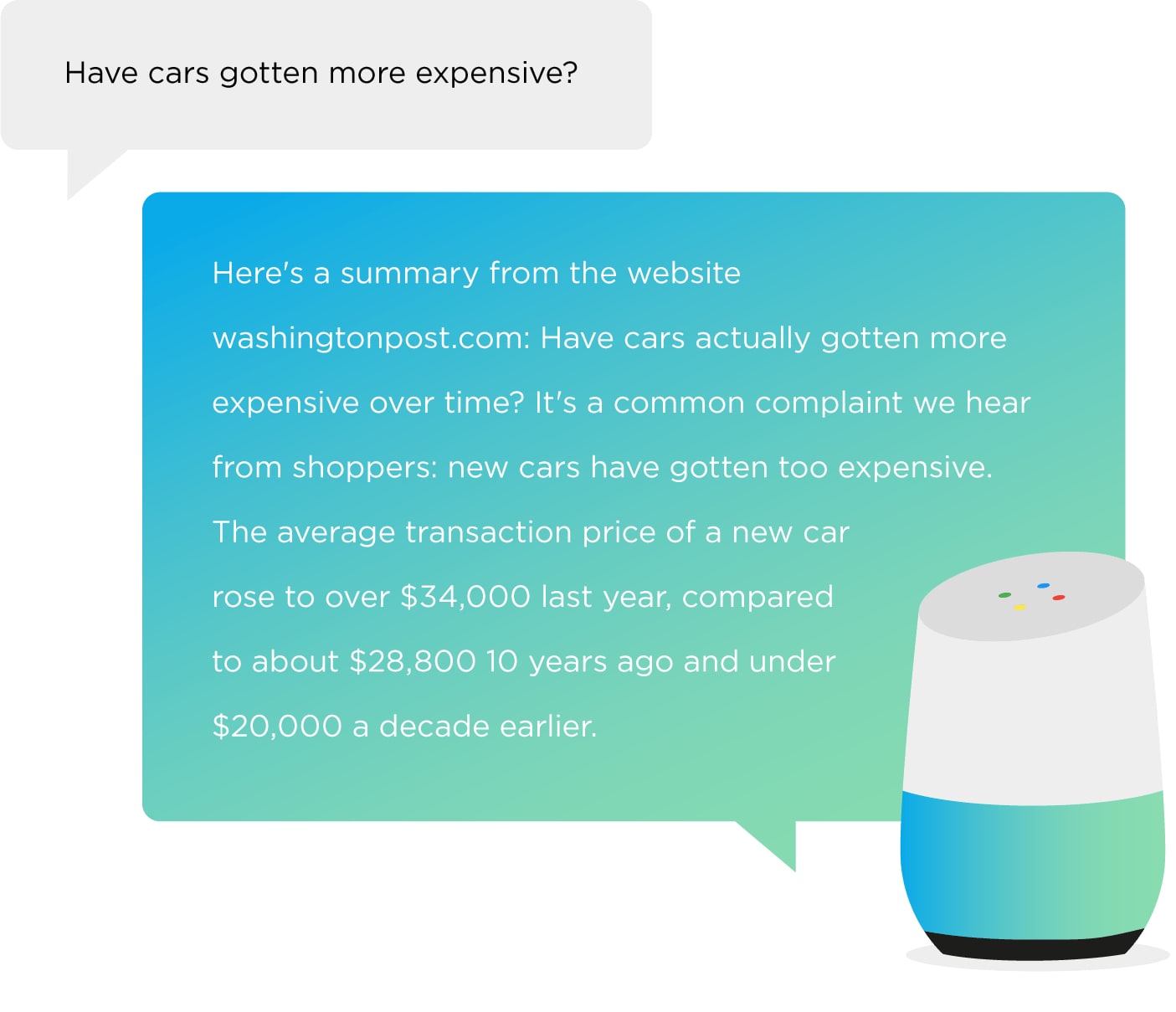
The DR of WashingtonPost.com is 93 from the results. But the authority of the page is 14 only.
Key Takeaway: The average Domain rating of a voice search result is 76+. That is why Voice search algorithm of Google may focus on trusted and authoritative domains.
Highly Shared Content Appears Often in Voice Search
Our research also shows that voice search results get high number of social media shares.

If we consider half of all the content gets more or less 2 Facebook shares, an average Facebook share count of more than 1000 is striking.
With that, I can conclude that voice search algorithm unlikely uses social signals. It can be a case of correlation rather than causation.
In fact, Google also reveals many times that they do not use social signals as their ranking algorithm.

And it is difficult to come up with a reason that the voice search algorithm will use social signals.
The data shows us that if the content is valuable and engaging, it will perform well in any search engine. It also includes voice search.
Key Takeaway: Highly shareable and valuable content can improve your chances of ranking as a voice search result.
Content That is Easy to Read (includes Readability level) and Understand Ranks Well in Voice Search
Google’s official Voice Search Rater Guidelines emphasize “Elocution”:

The question is: “Was it easy to understand the answer to your voice search?”.
The simpler language you use, the easier it is for Google to get the Elocution factor.
Indeed, I found that the average Google voice search result is written in the readability level of 9th grade.
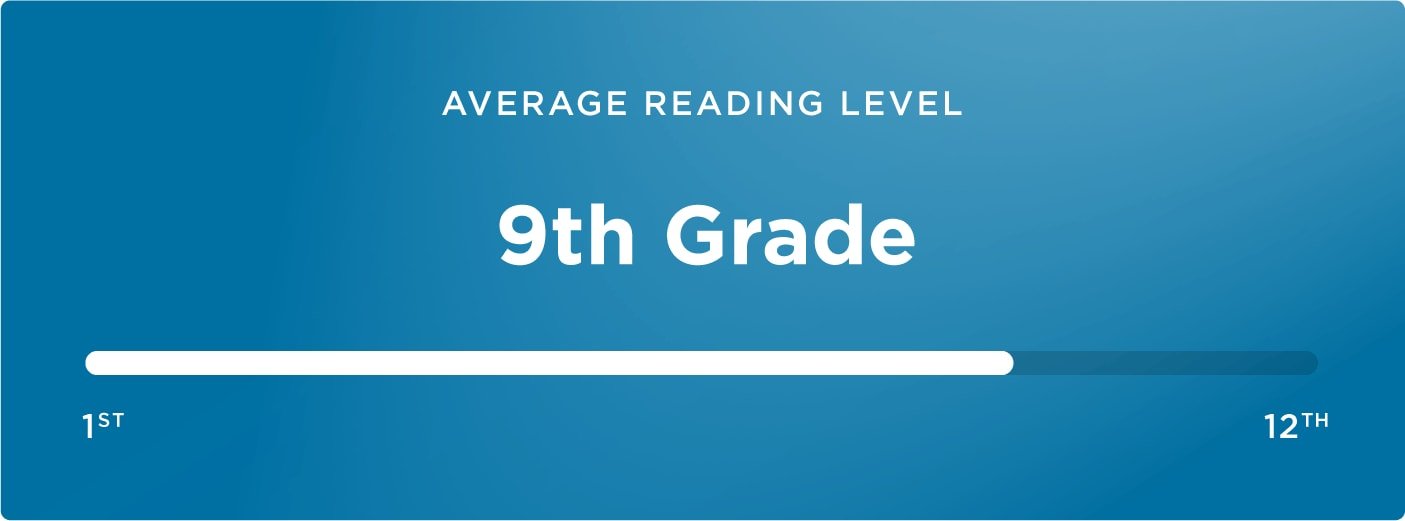
For example, here is a query and result from our data set:

The readability of that result is at a 3rd grade level.
Our research does not prove that Google can use reading level as a ranking factor in voice search algorithm too. But it is possible. It will be sensible for voice search algorithm to rank content which is easy to understand.
Just think about how radically different a Google Home result is vs. a list of 10 blue links:
- It needs to have simple words that are easy for Google to pronounce
- You need to comprehend the information without any visual reference
- You are not easily able to look up challenging words or phrases
Keeping that in mind, it is possible that Google may consider reading level and use it as a voice search ranking factor.
Key Takeaway: Usually, the average voice search result is written at 9th grade readability level. Publishing easy to understand and simple content can help you with voice search SEO.
Very Few Voice Search Results Contain The Exact Keyword In Their Title Tag
Should I create a piece of content for every single keyword that you want to get rank?
When you are taking voice search into consideration then the answer will be no.
In fact, only less than 2% of voice search results use the exact keyword in their title tag.
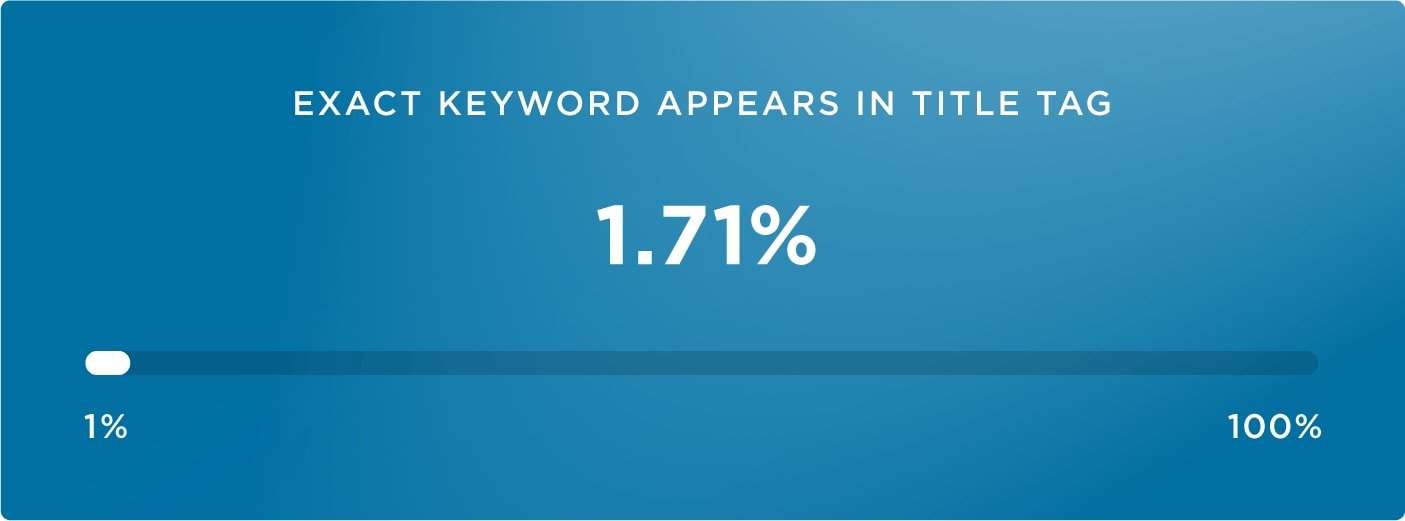
For example, this is a representative query and result from our research:

The text which matches the voice search keyword is smack dab in the middle of the page rather than in the title tag:
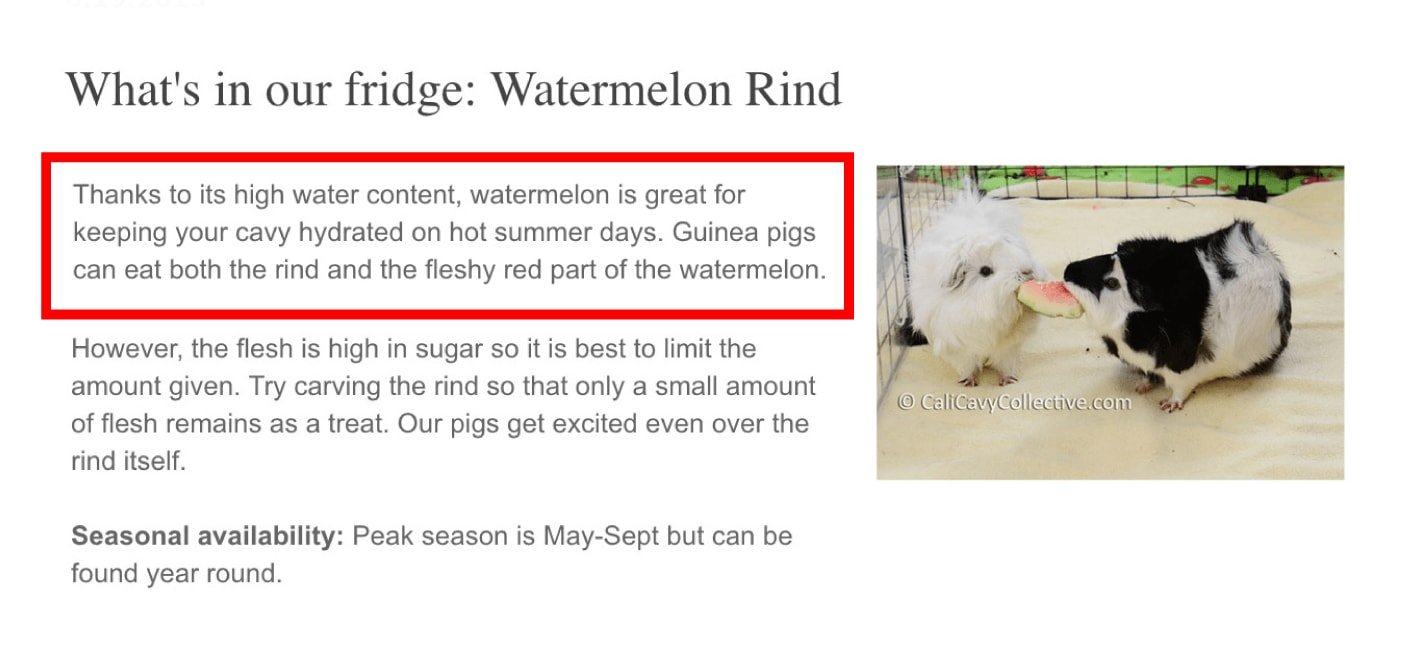
It seems that Google does not give importance to the title tag of the page in the voice search algorithm. If we compare it to the desktop search where it still plays an important role.
If true, this would make sense for two reasons:
Firstly, 20% of all mobile searches are now voice searches and According to Comscore, 50 percent of the searches are from Google search engine, Siri and Cortana. Due to a lot of searches, it will be impossible for Google to find the dedicated page for that keyword. Google also explores the full page for the best match for that particular voice search.
Secondly, people use desktop and voice searches in a different manner. Voice searches are 76% longer as compared to text-based searches. Longer searches make it difficult to get the exact phrase which is going to show in the limited space of the title tag.
In a nutshell, do not worry about creating individual pages or posts which are optimized for individual keywords. Write in-depth posts or content which has the ability to answer different voice search queries on a single page.
Key Takeaway: Title tag does not play an important role in voice search algorithm or optimization.
Long-Form Content Tends to Rank Best in Google Home Searches
I set a research to see If longer content (less than 1000 words) ranks best in voice search.
I did a research and discover that Google voice search results come from posts with a high word count.
Specifically, I found that the average word count of a Google voice search results page will be 2312 words.
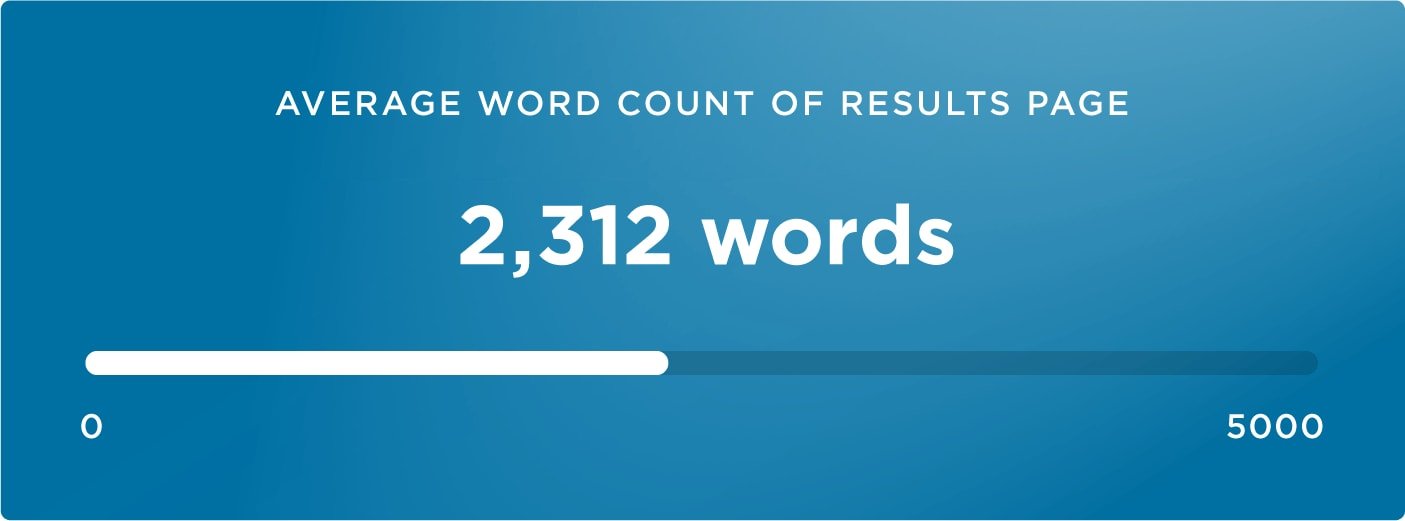
Does it mean that like desktop searches, Google homepage give preference to pages that have certain word count? Unlikely.
After as I previously discussed, voice search results are in average of 29 words. So there is no reason for Google to rank such a small snippet from such a large page.
There is a chance that is, more words=more opportunities to match as a voice search result.
For that reason, you may wish to publish longer content to rank more often in search results for voice searches.
In addition to the number of words, the structure of your content may play a role in voice search SEO.
I found that, search results where Google provides a source for their answer, 2.68% of the voice results come from FAQ pages.
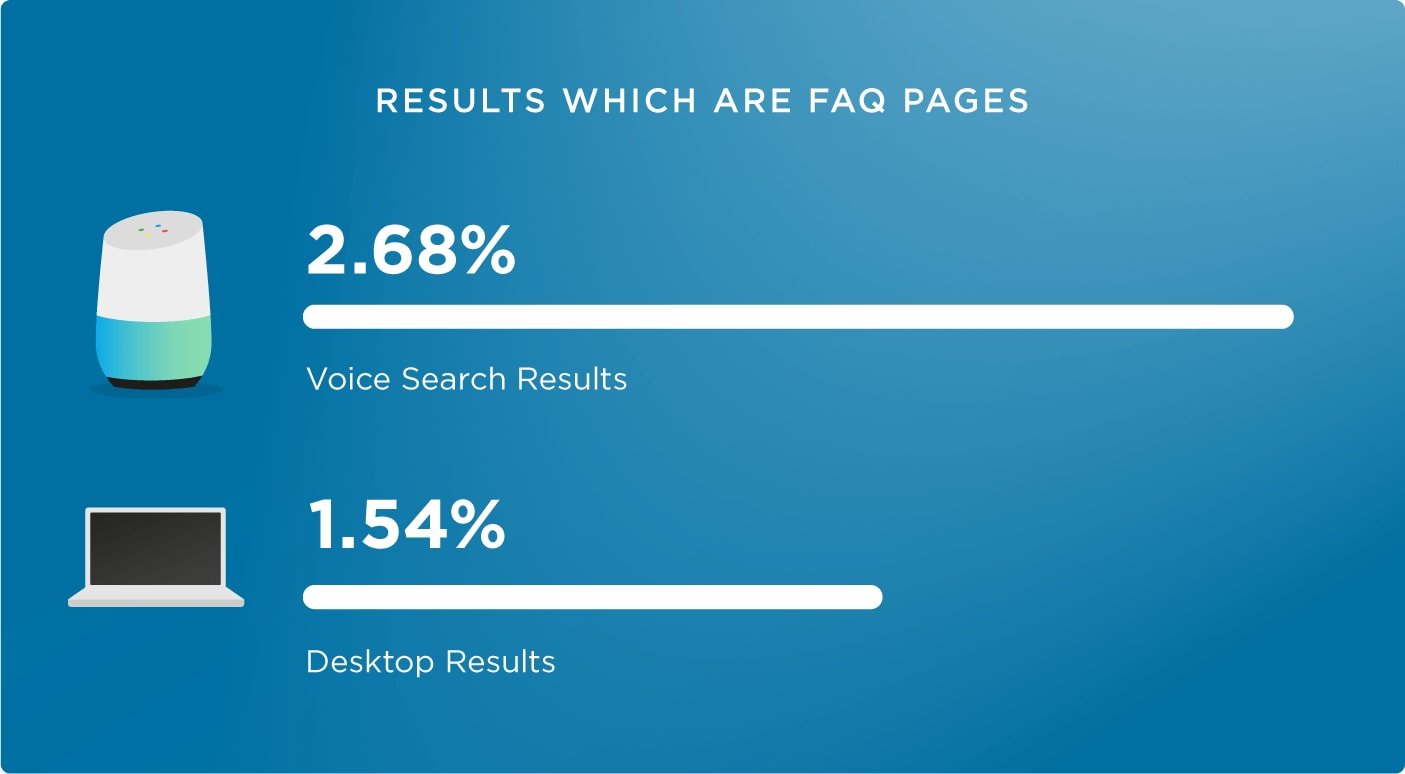
It makes sense. The exact type of question has a chance to find the match on an FAQ page.
In addition, FAQ pages are in such a format which are perfect for voice search: conversational answer with a brief answer right underneath it.
Here’s an example search from our dataset:
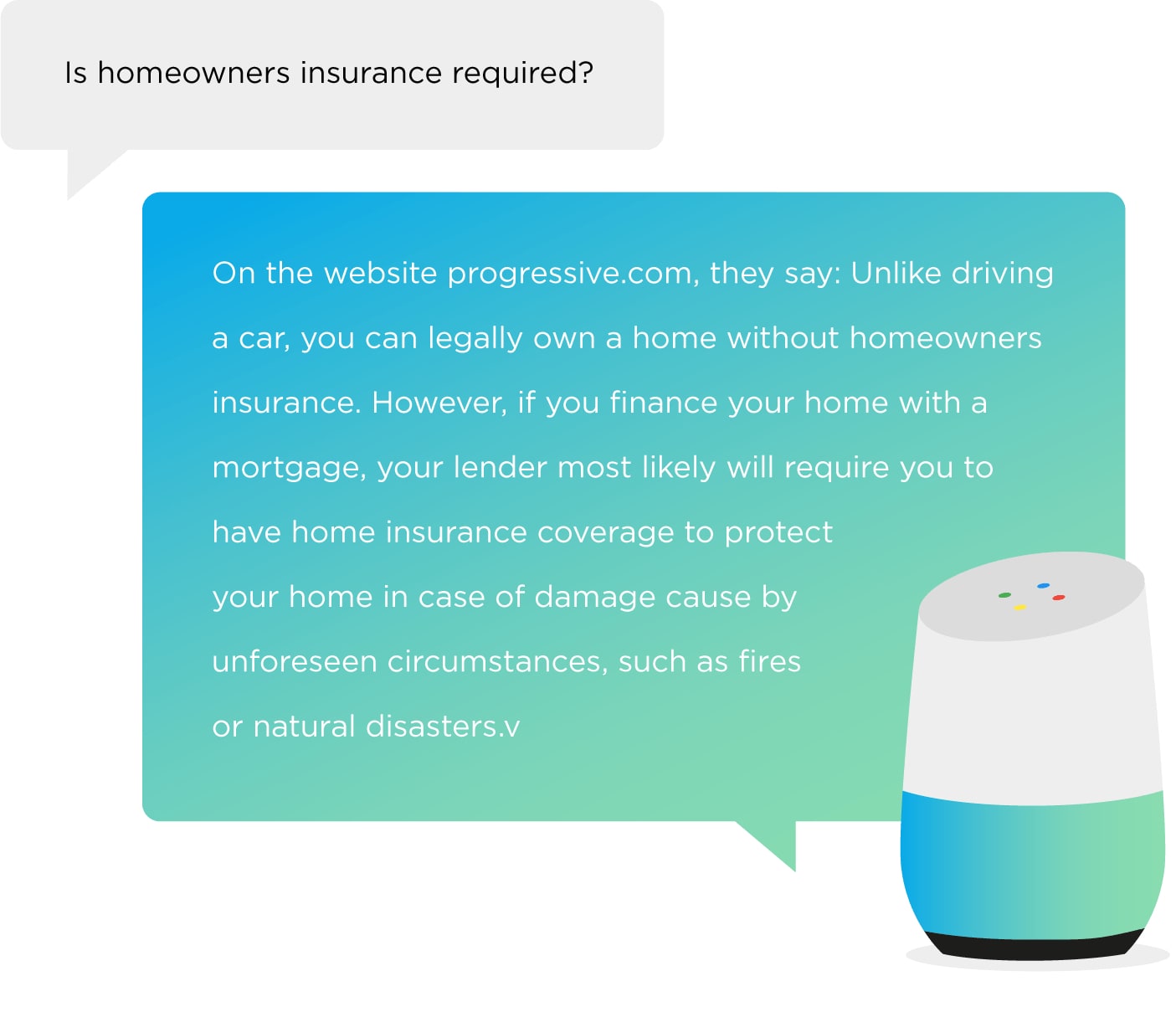
And the source of the answer (an FAQ page):
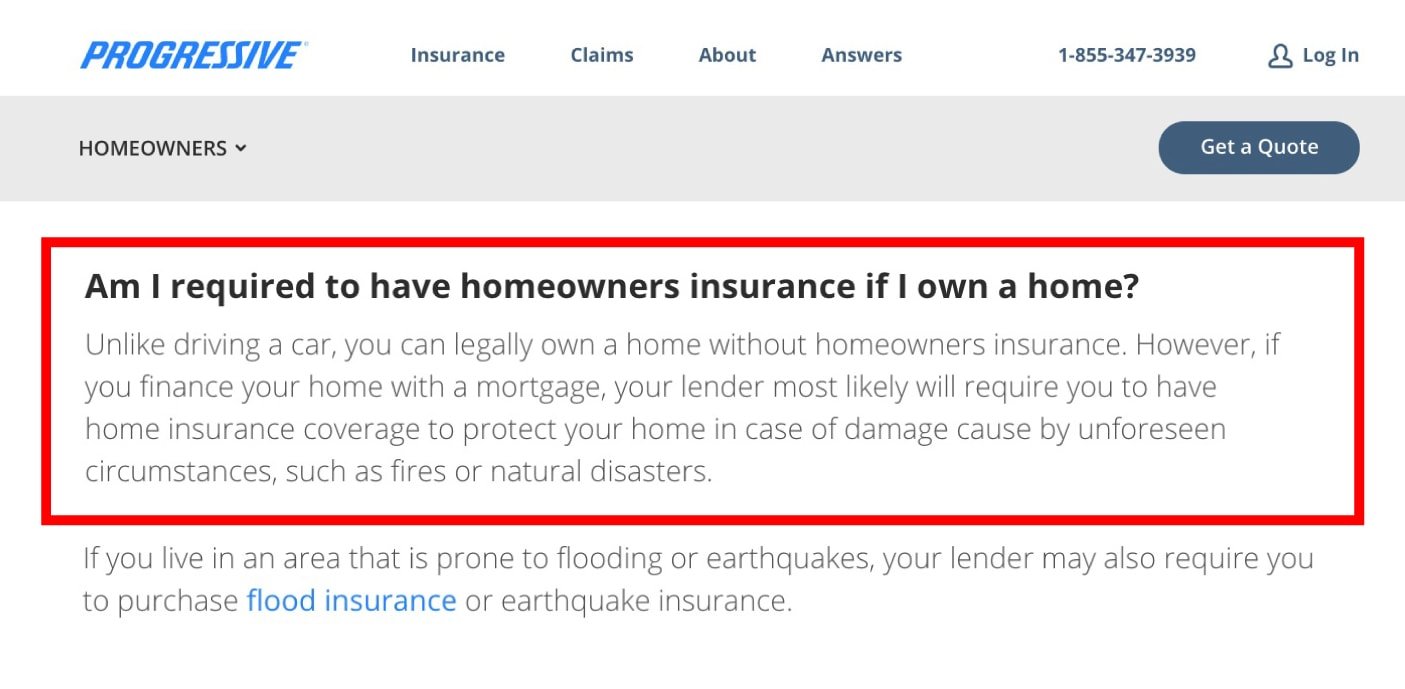
Key Takeaway: Longer content gets more opportunities for the text on your page to match the voice search keyword. FAQ pages tend to perform better in voice search results.
Higher Rankings=Increased Likelihood of Being a Voice Search Result
According to the research, there is a clear connection between rankings and being chosen as an answer for Google home questions or queries:
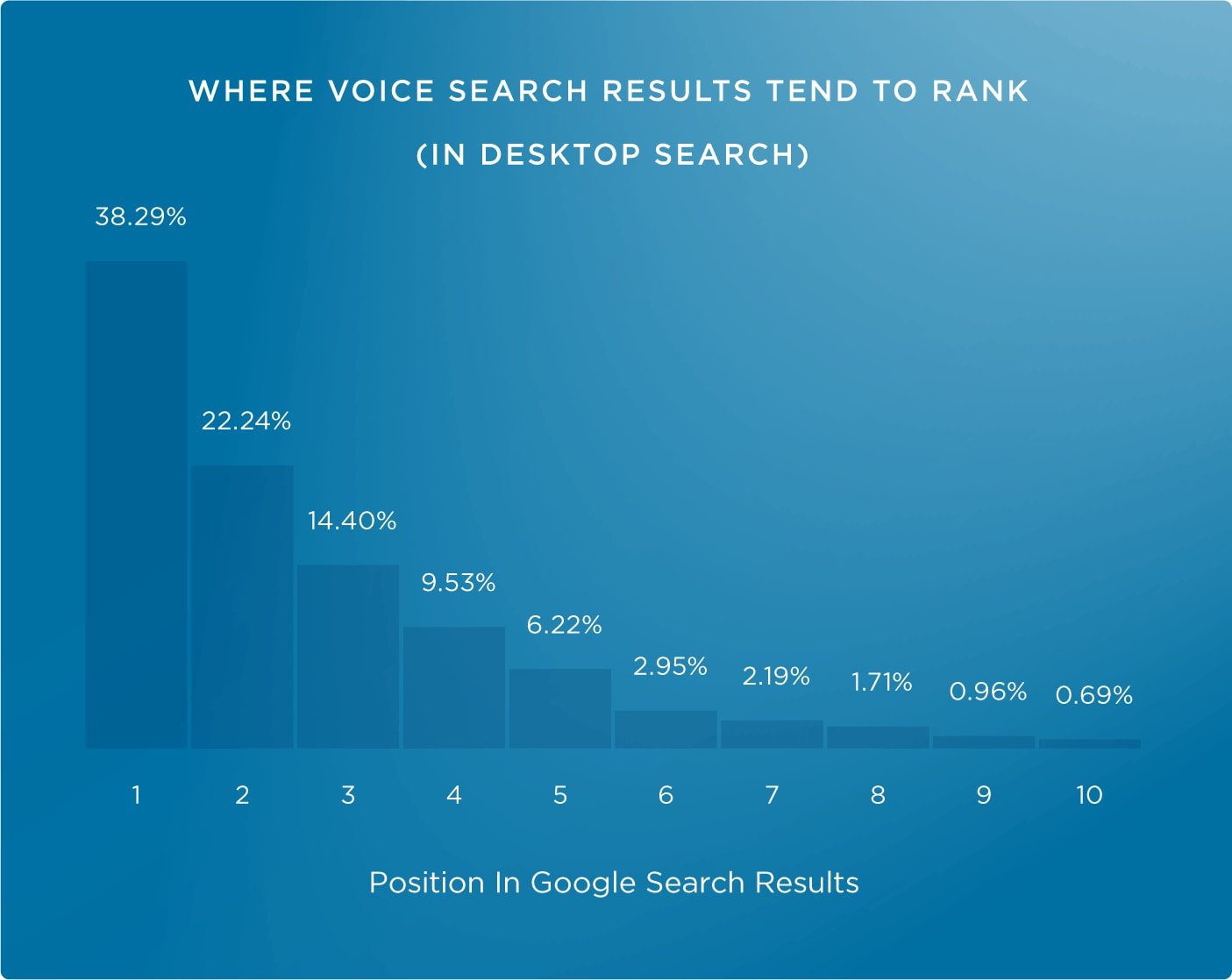
To be more specific, 74.9% of Google home results comes from a page ranking in the top 3 for that keyword.
In a nutshell, the higher a page ranks for a specific keyword, the more likely Google will select that post or page as the voice search result.
I should convey that there is a strong probability that this finding is not causation but purely a correlation. As I previously discussed, websites with high DA are preferred sources of voice search answers. In addition, sites with high DA also rank well in Google search rankings.
Google gives preference to get voice search results from high-ranking content. It is not possible to say from this data alone.
So it is clear: higher rankings in desktop search=higher chances of being a Google home voice search result.
Key Takeaway: Pages that are in top 3 results in desktop searches also dominate the voice search results. 74.9% of Google home results are sourced from a page that also ranks in top 3 position for that query in the desktop SERPs.
Appearing In Featured Snippets Appears to Be Extremely Helpful for Voice Search SEO
In several ways, Featured Snippets are ideal voice search results. They are brief answers from authoritative and trusted sources.
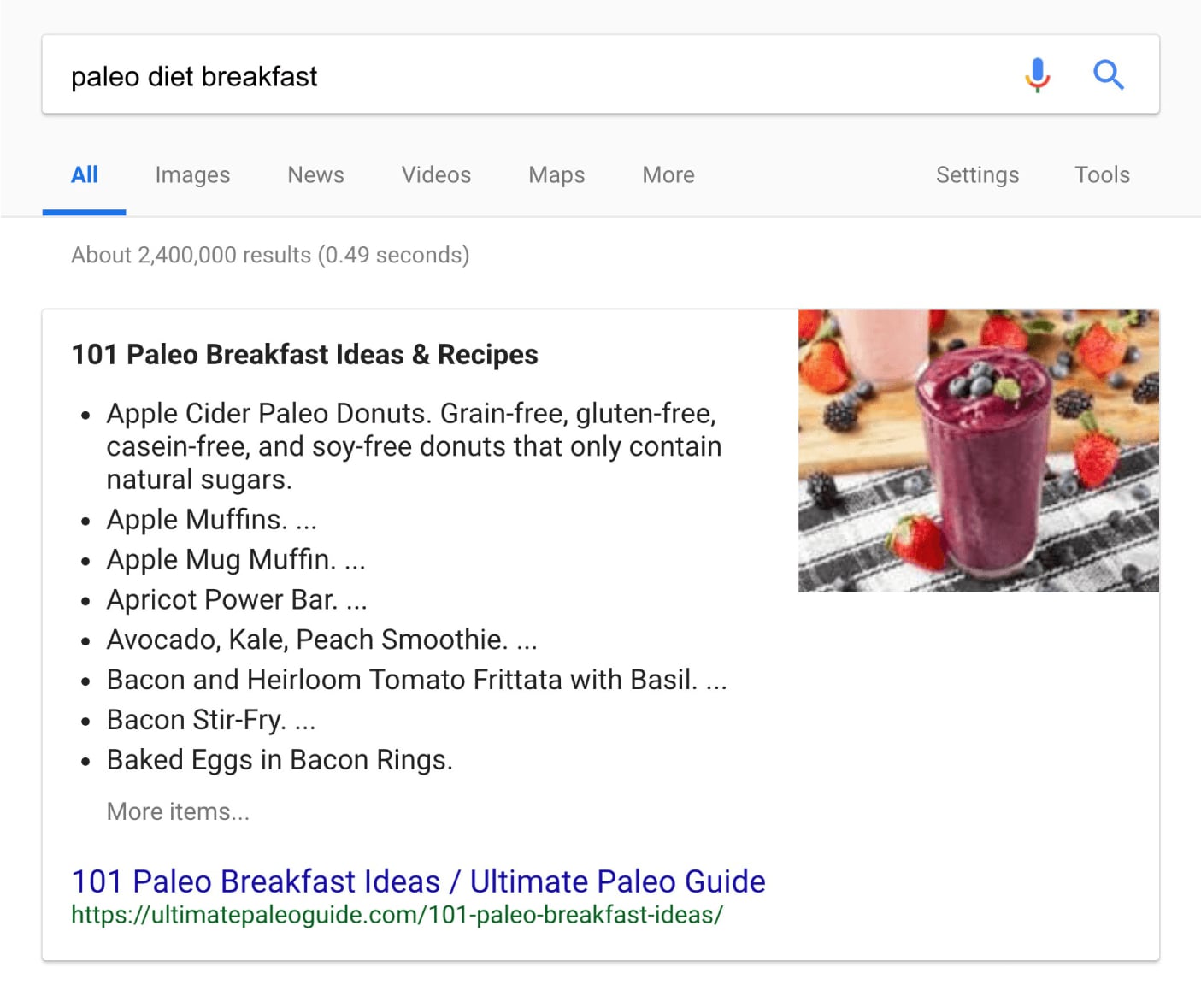
So I tried to observe how many voice search answers were simply come from Featured Snippet for that keyword in desktop search.
And I discovered that 40.7% of all voice search results came from a Featured Snippet.
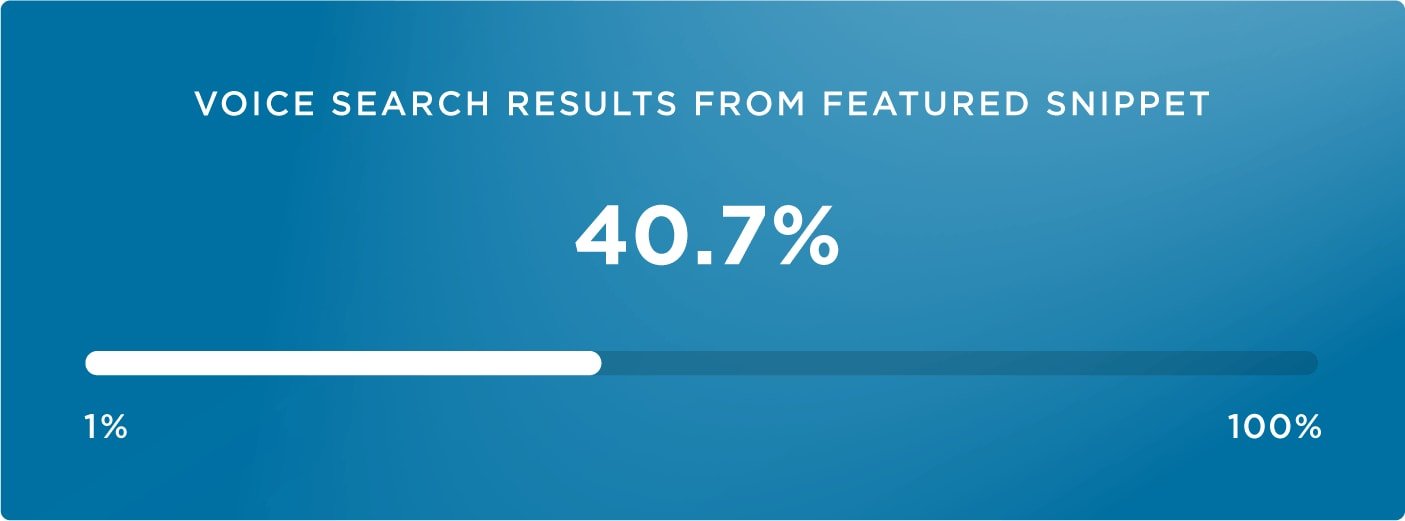
For example, here is an example of a Google Home question and answer from my research:
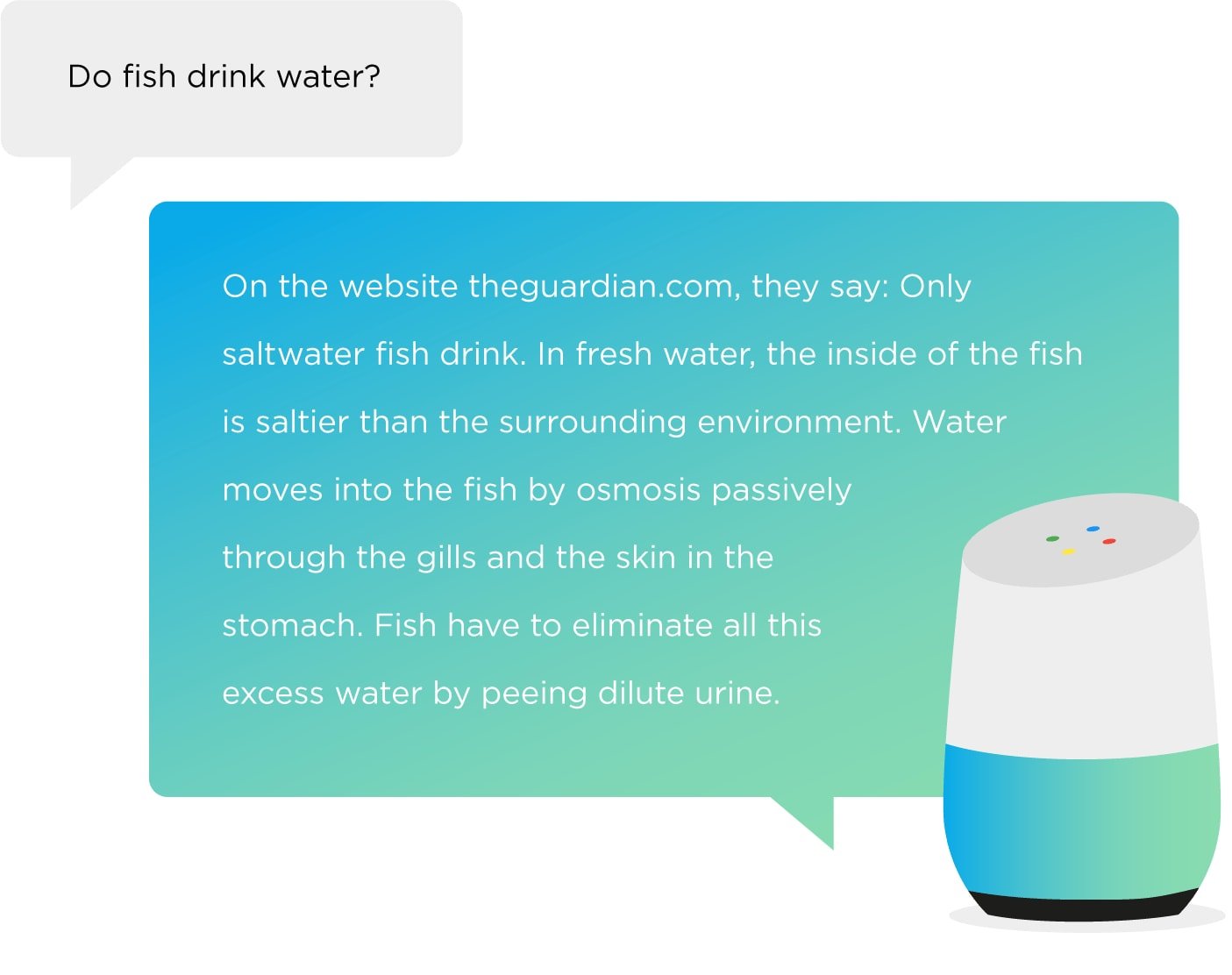
And also confident, when you will search that keyword in Google, that exact answer will be available in a featured snippet.
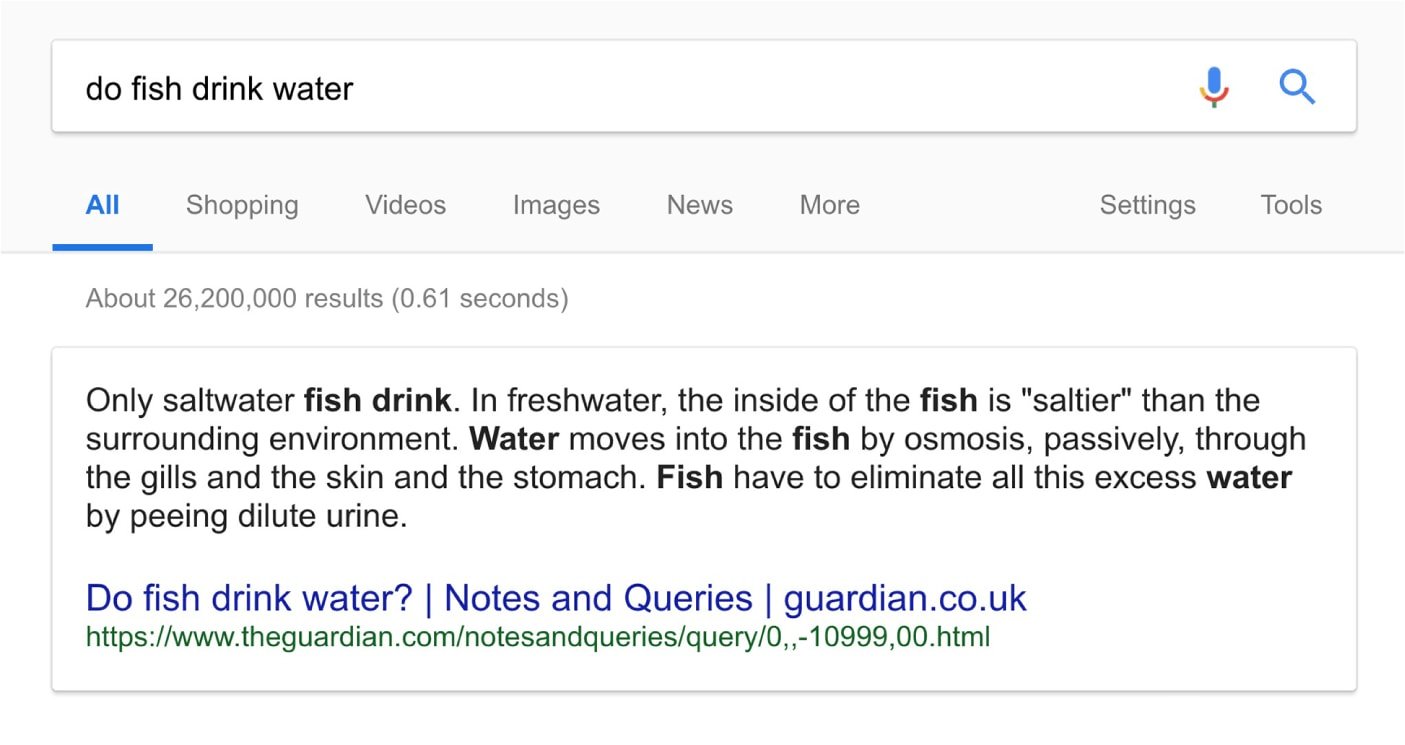
Key Takeaway: It seems to be helping to appear in the featured snippet. 40.7% of the voice search results are from featured snippets. So you can use it to rank in voice search too.
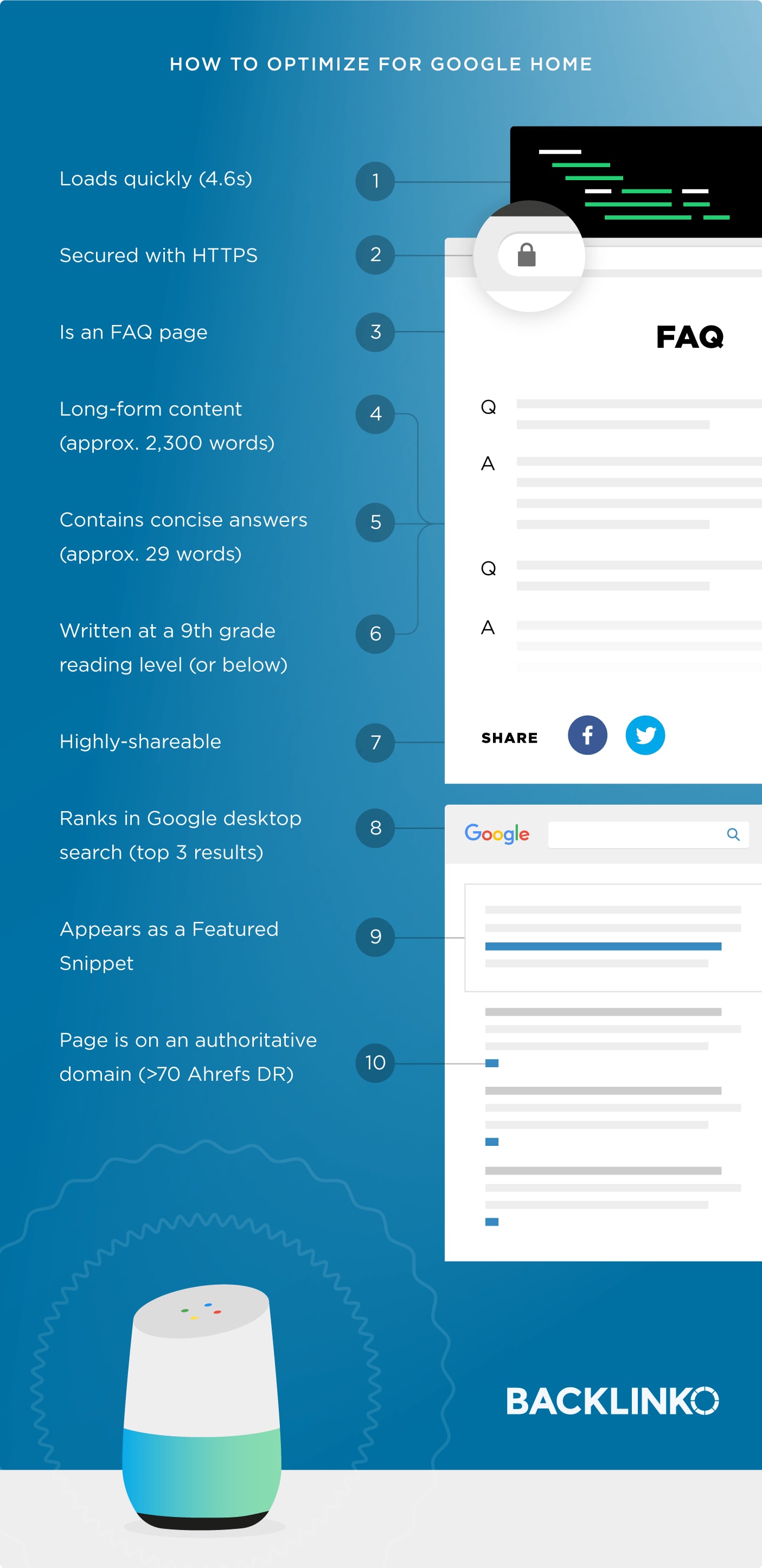
Summary and Conclusion
I hope this post helped you and you learn how to optimize your site for voice search.
Now it’s your turn:
What’s your #1 takeaway from this voice search study?
Do you have a question from this guide?
Leave it in the comment section.
Do not forget to share this post.
Arsalan Rauf is an entrepreneur, freelancer, creative writer, and also a fountainhead of Green Hat Expert. Additionally, he is also an eminent researcher of Blogging, SEO, Internet Marketing, Social Media, premium accounts, codes, links, tips and tricks, etc.